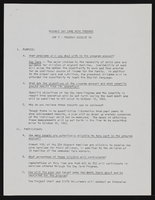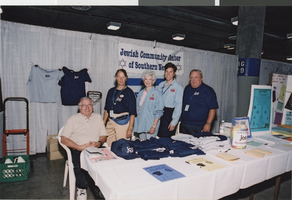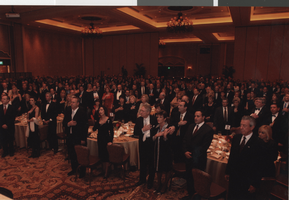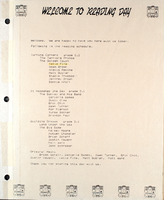Search the Special Collections and Archives Portal
Search Results
Steve Wynn oral history interview
Identifier
Abstract
Oral history interview with Steve Wynn conducted by David Schwartz on December 8, 2006 for the Remembering Jay Sarno Oral History Project. In this interview, Wynn discusses his relationship with Jay Sarno and Sarno's development of the Atlanta Cabana Motel in Atlanta, Georgia, as well as the early days of of Caesars Palace and Circus Circus in Las Vegas, Nevada.
Archival Collection
Dorothy Kelsey oral history interview
Identifier
Abstract
Oral history interview with Dorothy Kelsey conducted by James M. Greene on January 20, 1975 for the Ralph Roske Oral History Project on Early Las Vegas. This interview covers the early days of Nelson, Searchlight, and Las Vegas, Nevada, as Kelsey offers an in-depth personal narrative on the life of a local. The interview concludes with a discussion on hotels and casinos.
Archival Collection
Nicole Cristina Espinosa oral history interview
Identifier
Abstract
Oral history interview with Nicole Cristina Espinosa conducted by Yancy Bayoro on November 17, 2022 for the Reflections: the Las Vegas Asian American and Pacific Islander Oral History Project. In this interview, Espinosa recalls growing up in Vallejo, California as a first-generation Filipino-American. Because their parents had converted to Mormonism while still in the Philippines, Espinosa grew up surrounded by the Latter-day Saints (LDS) community, attending church every Sunday and going off to camp regularly. In their LDS community, the Espinosa family was often the only non-White family, while among the other Filipinos at school being the only Mormon among Catholics, creating a tension in their identity. Nevertheless, Espinosa had a large extended family nearby and fondly remembers spending time with them as a teenager. They talk about moving to Las Vegas, Nevada in high school because of the low cost of living and job opportunities. After graduating high school, Espinosa worked a number of jobs from TSA at the airport to retail at Urban Outfitters. Epinosa discusses their parent's experience with assimilation and the parts of Filipino culture that were left behind. Throughout the rest of the interview, Espinosa talks about a range of other topics such as public transportation, finding good food, and their AAPI identity.
Archival Collection

Transcript of interview with Roger Bryan by Paul Murphy, February 27, 1979
Date
Archival Collection
Description
Text

Migrant Day Care Work Program: documents
Date
Archival Collection
Description
From the Clark County Economic Opportunity Board Records -- Series II: Projects. This folder contains documents related to the Migrant Day Care Work Program circa 1969.
Text

Photographs of Israel Independence Day Celebrations, May 4, 2003
Date
Archival Collection
Description
Photographs of Independence Day celebrations, May 4, 2003.
Image
Joseph Kine oral history interview
Identifier
Abstract
Oral history interview with Joseph Kine conducted by James Greene on December 19, 1974 for the Ralph Roske Oral History Project on Early Las Vegas. This interview covers the early days of Boulder City, Nevada from the perspective of an old-timer. Mrs. Kine is also present during the interview. They discuss education, home, and family life, in Boulder City.
Archival Collection

Photographs of Israel Independence Day Celebrations, circa 1995
Date
Archival Collection
Description
Group of photographs of Israel Independence day events in various locations, dates unknown.
Image
Georgia Adras oral history interview
Identifier
Abstract
Oral history interview with Georgia Adras (b. 1916) conducted by Robin L. Hayes on March 02, 1977 for the Ralph Roske Oral History Project on Early Las Vegas. Adras relocated to Las Vegas, Nevada from Farmington, Utah in 1936. This interview covers education, religion, ad raising a family in Nevada. During the interview Adras also discusses the building of the Boulder Dam, road conditions, grocery shopping in the early days, and the Strip.
Archival Collection

